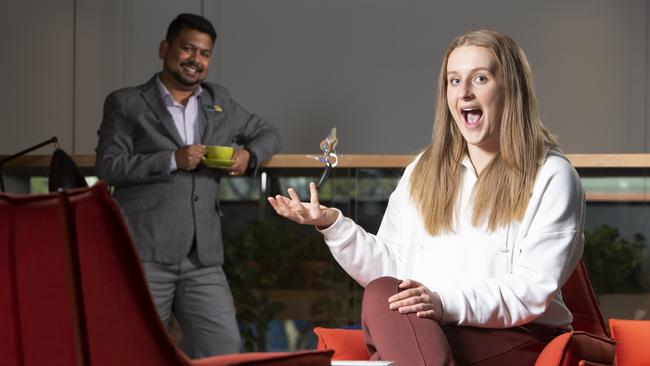Risk for kids in making all government and business services digital first
More government services – and businesses – are going online. But there’s a huge risk, and it’s not just about privacy.
SA News
Don't miss out on the headlines from SA News. Followed categories will be added to My News.
A push to make all government and business services “digital first” should be reconsidered because many young people wanted or needed to interact in person, the Commissioner for Children and Young People says.
This was often the case for services such as getting a driver’s licence or opening a bank account.
There was also a danger of a simplistic analysis of a digital divide between the haves and have nots, commissioner Helen Connolly says in a report to be published on Thursday.
Young people experience a range of access to digital technology – some have excellent access, some are permanently disadvantaged and some have intermittent problems.
To address this, a nuanced digital strategy is needed, Ms Connolly said in releasing her My Digital Life report.
Young people regard technology as simply part of life and “don’t make a hard distinction” between their online and offline lives.
But this did not mean everything possible should be online.
“Organisations are actively transferring some parts of their face-to-face services on to a website or smartphone app,” Ms Connolly said.
“The business case for doing so is based on the belief that customers will prefer this.”
However, a survey of 253 young people, workshops and hundreds more conversations had persuaded Ms Conolly to challenge that assumption.
“Young people have said loud and clear that not everything needs to be online, and they often want face-to-face customer service,” Ms Connolly said.
Peoples Choice Credit Union customer Mackenzie Revitt, 18, said she valued being able to talk through getting a car loan.
“There’s a lot I don’t know about loans and I feel like I have a much better opportunity to really unpack it a lot deeper if I’m having a proper meeting,” she said.

“There’s also a chance to look at documents or brochures, and the conversation can naturally evolve and allow me to clarify things as I go.”
People Choice spokesman Stuart Symons said digital allowed people to bank when it suited them, but sometimes tailored support was required.
“Younger people, first-time borrowers, are often looking for a lot of detail,” he said.
Ms Connolly said young people with limited digital access were at risk of being left behind.
This had been highlighted by Covid-19 restrictions pushing education online.
Of those surveyed, 77 per cent said the cost of digital devices was a problem.
Many young people spoke of sharing an unstable internet connection with others at home or having to go to a public library or McDonald’s for free Wi-Fi.
The Commissioner has made four recommendations:
ESTABLISH a task force to ensure SA can apply world-best strategies to increase digital access.
EXPAND free Wi-Fi to public transport, public buildings and community areas.
REVIEW the government’s digital first strategy.
PROVIDE free laptops and data packs to all students where the family is on School Card.
There are about 62,000 students on School Card in SA.


